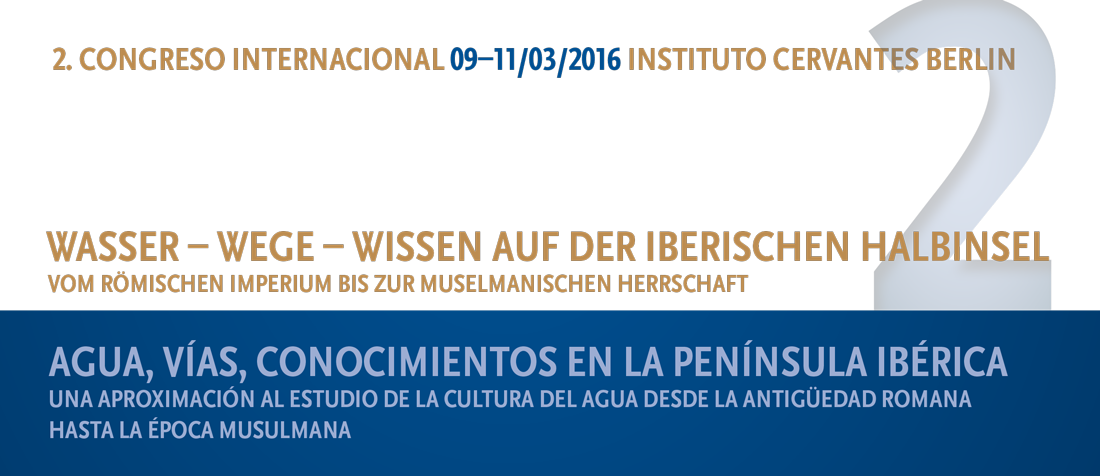Subject of the project´s research were treatises and sentences that have survived from the time of Al-Andalus in water law. It is important to find classifications for the water, as this determines the legal regulations. That is what we can take from the sources. The usage and acquisition of water also depends on the classification. The work of the courts in the districts of Al-Andalus has been the focus of the project.
Research
Research and first results
The case law in water matters is often confused with the legislation on water in Al-Andalus. At first, all three branches of government in a modern sense were united in the Caliph: the legislative, executive and judicial branches, the latter being represented by the role of the Qadi. In the lower courts one can distinguish among judges with a limited portfolio, those that adjudicate in marital affairs and water judges. The hierarchical structure among the offices of the Qadi is not entirely clear.
Due to the nature of the office and the court as a one-person court it follows that the Qadi was one of the most important offices of administration in Al-Andalus. The Qadi could grant audiences in any place he wished, as long as the parties involved could reach it. Usually, the mosque was the seat of the court. The Qadi was able to select the mosque closest to him as the seat of the court. In the mosque itself, the Qadi could select any spot he wished for the court: the prayer room, the portico, or even the courtyard. Not prohibited, but not recommended, was the Qadis residence.
The so-called mufti, a specialist in the interpretation of the Fiqh, advised the judge. The mufti assisted the judge if there was doubt in individual cases regarding the interpretation of the relevant passages of the Quran and Sunna. He is appointed as a servant of the community as a consultant and with the task of advancing the teachings on the existing laws. We come across the following institutions dealing with the adjudication of water issues: the specialised judge in water matters was the Qadi A-Miyah, the Qadi of water affairs. Due to their importance the water matters, as we can see, were entrusted with a special judge and not left to the general Qadis.
The water judge was tasked with adjudicating in cases that touched upon the issues of water. He was the final instance relating to the distribution of water and appointing the watch duties to protect the water. Regarding the irrigation, there was a further institution, the Sahib Al-Aqiya, the ‘Commissioner for irrigation trenches and sewage canals’. He regularly inspected the irrigation canals. He marked the watering areas and supervised the compliance with the relevant regulations. He was subject to the authority of the Qadi, and appointed by the Qali (governor) or directly by the Emir. It was his job to mediate between the users and owners of the properties receiving water and to maintain a just distribution of water. Additionally, he was tasked with ensuring that the users held the canals and water in an orderly and clean fashion. The distribution of water among the lands and properties was supervised and controlled rigorously. His decisions were provided orally and included penalties for the violation of the legal provisions.Judgements of Islamic courts that have already been reviewed show references to the Pandects (Corpus Iuris Civilis of Justinian) of Roman law. This finding is of major importance, as it shows that, in practice, Islamic courts gave reference to the sources of Roman law.
Activities
Three international and interdisciplinary congresses (Wasser – Wege – Wissen auf der Iberischen Halbinsel) held in Elche/Spain (University of Miguel Hernandez) and Freie Universität Berlin with legal historians, historians, archaeologists, art historians and anthropologists have shown that the theme of water in Al-Andalus is a very complex matter. The first volume of the meeting in Elche has been edited in the year 2016:
Cooperation
An intensive cooperation existed with Prof. Dr. Magdalena Martínez Almira, University of Alicante and Prof. Dr. Jose Antonio Perez Juan, University of Elche.
Future research
The finding of digest quotes in the rulings of Islamic courts of the Al-Andalus surely represents a minor sensation, if one bears in mind that two different legal cultures are united in one decision.
Thereby the question of the influence of Roman law on Islamic Law is touched. A theme which since the edition of Joseph Schachts book ”The Origins of Muhammadan Jurisprudence” in the year 1950 circulates. In recent years the research activities have increased. The influence of the byzantine and sassanian model on the administration of the Islamic imperium is meanwhile unquestioned. Benjamin Jokisch in his work 2007 indicates a notable procedure of reception: he points up the parallel between the monumental work of Asch-Schaibānī (749/750–805), one of the founders of the Hanafi law school under caliph Hārūn ar-Raschīd (ca. 763–809), and the opus of Justinian, the digests. With this theses is ensured that the discussion of the non-Islamic sources in Islamic law is not finished yet. Now it is established that the Islamic courts in water law knew of the digests, but not how they gained this knowledge. This will be the focus of future research.

